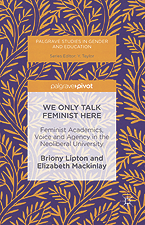
Briony Lipton & Elizabeth Mackinlay.
Palgrave Macmillan, 2017; 128 pp;
ISBN: 978-3-31940-077-8.
by Penni Stewart
It’s been more than three decades since the creation of women’s studies programs, harassment policies and affirmative action programs. Yet gender inequality persists. Although women are now the majority of undergraduate students — outside the non-STEM disciplines — and a majority in many graduate programs, female academics, especially racialized women, Indigenous women and women with disabilities continue to be underrepresented, especially in tenure track jobs. Inclusion is not only an issue of representation, as feminist voices and perspectives continue to be marginalized.
Women’s exclusions and inclusions in the academy is the subject of We Only Talk Feminist Here. Finding space and voice in the rapidly corporatizing university are two key issues. Their central questions include: what are the possibilities for talking feminist in the neo-liberal academy? What are the complexities? How are feminist voices received? How can feminists resist or as the authors say “talk back”?
Briony Lipton and Elizabeth Mackinlay draw on interviews with academics, though formally, just six, and only in the social sciences and humanities at Australian universities. The omission of interviews with female academics in sciences, technology, mathematics and engineering gives an unfortunate emphasis to the humanities side of the academic divide.
The authors focus on the rise of the neo-liberal university, with its emphasis on a business model that replaces shared governance with business management, and where an increasingly casualized and stratified faculty competes for scarce funding and other research resources. The modern university’s embrace of equity, harassment and other policies, Lipton and Mackinlay note, appears to be the continuation, not the end of discrimination. The authors argue that harassment policies set up individual victims and perpetrators, and in the process deflect attention from systemic organizational and cultural issues and power inequalities. Despite these policies, recent sexual harassment scandals at North American universities show complainants continuing to be marginalized, due process denied, and transparency lacking.
Lipton and Mackinlay are most interested in the culture of the university and how feminist voices are forced into the normative mode of academic talk, and in how to challenge this and transform structure. They draw heavily on the work of Sara Ahmed and Helene Cixous. Ahmed’s playful descriptions of feminist killjoys and concept of feminist willfulness are used as examples of how to talk feminist with commitment and emotion, thus attacking the masculine tradition of neutral academic speech and writing. Inserting the authorial voice into the story and using feminist methods including narrative and autoethnography are another.
Where do we go from here? For Lipton and Mackinlay the challenge is resisting the neoliberal agenda. They describe their worry that feminists have moved from concerns of social justice and social change to liberal distractions like “women in leadership.” Unfortunately, they have little advice to offer. The most disappointing aspect of this book is the absence of discussion about how to build collective responses and create an alternative world. The authors do write about the importance of collective solidarity and offer the hope of inspiring transformation, but do little to guide the reader. There is nothing here about unions, or associations or ally building that might be used to build a movement toward social justice.
_________________________________________________
Penni Stewart is an associate professor in the department of sociology at York University.